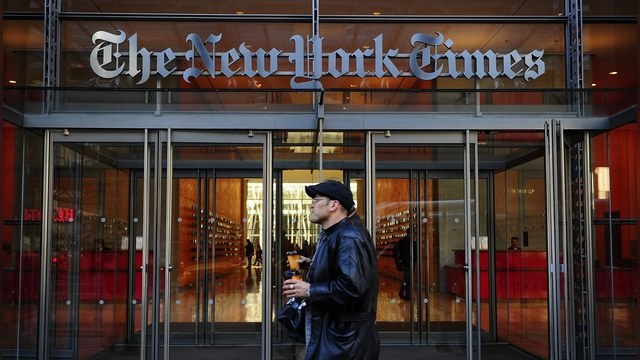American media have dreamed that the Kremlin is "scared" sanctions
In the publications of the American media, especially The New York
Times, about the Ukrainian crisis, falsehood more than truth, says
analyst Consortiumnews Robert Perry. They paint a picture of the information, without having to worry about data validation. So it was at the time of publication on the supply of Russian equipment militias. Now they claim that the entire peace process began, due to the fact that the Kremlin was afraid of sanctions.

From the very beginning of the crisis Ukrainian edition of The New York Times promoted "a false account of the situation" in the region, accusing the crisis "Russian aggression," writes journalist Robert Perry.
Now, in connection with the recent initiatives of President Vladimir
Putin to achieve peace in Ukraine, the newspaper would have to change
their "version of events."
In a recent article, The New York Times explained Putin's call for a ceasefire US pressure on him. Correspondents edition Andrew Roth and David Hershenhorn wrote: "Faced
with the threat of further economic sanctions Washington, Russian
President Vladimir Putin discussed the extension of the truce, which
should be finished by Friday"
Then the article goes on in a typical State Department and the leading US media "hard, terrible ultimatum" tone: "The
Obama administration has made a plan to strengthen sanctions against
Russia if it does not support the current peace plan, stop the flow of
weapons and fighters across the Russian border."
Newspaper, said Perry, also without its share of skepticism published
unsubstantiated allegations that the Russian government delivers heavy
armed militias south-east of Ukraine.
Of course, there is another version that explains the recent behavior of Putin, said the journalist. The Russian president has never had the Ukrainian crisis and did not plan it. Part of the situation in Ukraine was the result of provocation US and Europe, the purpose of which was to isolate Putin. The Russian president has responded to these "maneuvers of the West", but was always ready to compromise as long as it did not go counter to the strategic interests of Russia.
From the outset, the author argues, Putin hoped to resolve the crisis through discussion with his "onetime ally" of Barack Obama. Afraid of being branded a coward, the American president was acting like he was advised "State Department hawks" thirst second Cold War. In the end, "common voice" in the Obama administration prevailed, and he began to answer calls Vladimir Putin met with him in France.
According to Perry, Putin also began to examine Poroshenko as "rational choice" for the post of Ukrainian president.
As a gesture of goodwill, the Russian president even offered to cancel
the decision of the Federation Council on the use of the army in the
Ukraine.
However, these developments have created a dilemma for The New York Times and other major news US media. "If
the Ukrainian crisis was only a pretext for Vladimir Putin, to seize
territory and restore the" Russian Empire ", why he is so eager to
conclude a peace agreement?" - Asks a rhetorical question Perry.
Therefore, the Western media, said the journalist, a new version of
events: Putin Ukraine plunged into a crisis to grab Eastern Europe, but
had to withdraw due to harsh statements from Washington.
In other words, the leading US media believe that they were not
mistaken in its coverage of the Ukrainian crisis, and the Kremlin "scared" sanctions.
According to Perry, the fact that this kind of reasoning makes little
sense, because of the imposition of sanctions affected European
countries, is not particularly interested in the American press. "The new false account of events was necessary to cover the old" - says the author.
The reluctance of The New York Times and other respected American
publications to admit that they were wrong again in the coverage of
major international events, has brought major US media in "another rabbit hole" errors and misunderstandings. "Instead, all they took only an ingenious fix set of events," writes in the conclusion of the article, Robert Perry.
Photo: EMMANUEL DUNAND / AFP
No comments:
Post a Comment